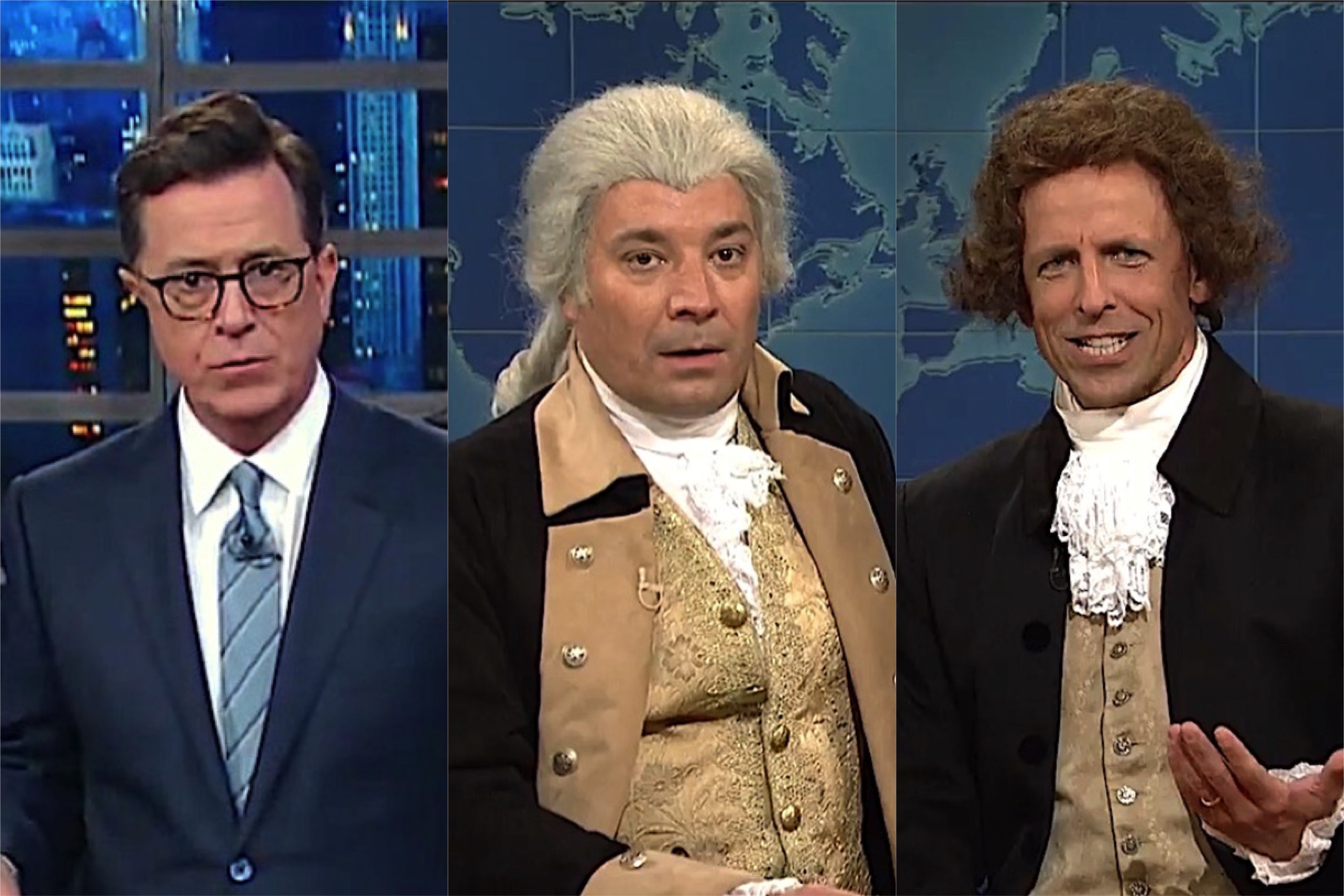Stephen Colbert, SNL creatively explain why George Washington and Robert E. Lee are not the same


A free daily email with the biggest news stories of the day – and the best features from TheWeek.com
You are now subscribed
Your newsletter sign-up was successful
President Trump "has had a lot of problems with history this week, mainly how he'll be remembered by it," Stephen Colbert said on Thursday's Late Show, "but also with defending the Confederacy." Colbert took special issue with Trump's argument, on Twitter and at a press conference, that because George Washington owned slaves, the decision to take down a statue of Confederate Gen. Robert E. Lee will lead America down a slippery, heritage-erasing slope to removing statues of Washington and fellow slave owner Thomas Jefferson.
"Comparing Robert E. Lee to George Washington and Thomas Jefferson is just willful dumminess," Colbert said, coining a word. "Washington and Jefferson have monuments not because of the slaves but because they fought the British, founded the country, and wrote the Declaration of Independence. We have statues of Robert E. Lee because he chose to secede and fight for slavery." Taking down Confederate statues "isn't about denying that slavery happened, it's about not celebrating the people who fought to keep it going," he said. "That's why we remember the Titanic but don't erect a monument to the iceberg."
On Saturday Night Live's Thursday night "Weekend Update," Michael Che invited George Washington, as played by Jimmy Fallon, on to defend himself. "About this Robert E. Lee thing, I'm nothing like that guy," Fallon's Washington said. "I created this country, he tried to tear it apart. I rebelled against England, he rebelled against America. Him bad, me the founding father, the original dad — Who's your daddy? Me!" He tried to leave, but Che stopped him, reminding him that he (Washington) did own slaves. Fallon said Jefferson was worse, prompting Jefferson (Seth Meyers) to come out and accuse him of throwing him "under the carriage."
The Week
Escape your echo chamber. Get the facts behind the news, plus analysis from multiple perspectives.

Sign up for The Week's Free Newsletters
From our morning news briefing to a weekly Good News Newsletter, get the best of The Week delivered directly to your inbox.
From our morning news briefing to a weekly Good News Newsletter, get the best of The Week delivered directly to your inbox.
After some playful banter, the two founding fathers looked solemnly into the camera, music playing. "In the end, Michael, we don't need statues to commemorate us," said Fallon. Meyers' Jefferson concurred: "Our legacy is the country that we risked our lives to create." "That is why this great nation has given us an honor greater than any statue," Fallon said: "a three-day weekend in February during which all Americans get 50 percent off all mattresses."

For a more serious discussion, CBS News political director John Dickerson gave Colbert his historical opinion in the last minute of his Late Show interview. Watch below. Peter Weber
A free daily email with the biggest news stories of the day – and the best features from TheWeek.com
Peter has worked as a news and culture writer and editor at The Week since the site's launch in 2008. He covers politics, world affairs, religion and cultural currents. His journalism career began as a copy editor at a financial newswire and has included editorial positions at The New York Times Magazine, Facts on File, and Oregon State University.
-
 Tourangelle-style pork with prunes recipe
Tourangelle-style pork with prunes recipeThe Week Recommends This traditional, rustic dish is a French classic
-
 The Epstein files: glimpses of a deeply disturbing world
The Epstein files: glimpses of a deeply disturbing worldIn the Spotlight Trove of released documents paint a picture of depravity and privilege in which men hold the cards, and women are powerless or peripheral
-
 Jeff Bezos: cutting the legs off The Washington Post
Jeff Bezos: cutting the legs off The Washington PostIn the Spotlight A stalwart of American journalism is a shadow of itself after swingeing cuts by its billionaire owner
-
 ‘One Battle After Another’ wins Critics Choice honors
‘One Battle After Another’ wins Critics Choice honorsSpeed Read Paul Thomas Anderson’s latest film, which stars Leonardo DiCaprio, won best picture at the 31st Critics Choice Awards
-
 A peek inside Europe’s luxury new sleeper bus
A peek inside Europe’s luxury new sleeper busThe Week Recommends Overnight service with stops across Switzerland and the Netherlands promises a comfortable no-fly adventure
-
 Son arrested over killing of Rob and Michele Reiner
Son arrested over killing of Rob and Michele ReinerSpeed Read Nick, the 32-year-old son of Hollywood director Rob Reiner, has been booked for the murder of his parents
-
 Rob Reiner, wife dead in ‘apparent homicide’
Rob Reiner, wife dead in ‘apparent homicide’speed read The Reiners, found in their Los Angeles home, ‘had injuries consistent with being stabbed’
-
 Hungary’s Krasznahorkai wins Nobel for literature
Hungary’s Krasznahorkai wins Nobel for literatureSpeed Read László Krasznahorkai is the author of acclaimed novels like ‘The Melancholy of Resistance’ and ‘Satantango’
-
 Primatologist Jane Goodall dies at 91
Primatologist Jane Goodall dies at 91Speed Read She rose to fame following her groundbreaking field research with chimpanzees
-
 Florida erases rainbow crosswalk at Pulse nightclub
Florida erases rainbow crosswalk at Pulse nightclubSpeed Read The colorful crosswalk was outside the former LGBTQ nightclub where 49 people were killed in a 2016 shooting
-
 Trump says Smithsonian too focused on slavery's ills
Trump says Smithsonian too focused on slavery's illsSpeed Read The president would prefer the museum to highlight 'success,' 'brightness' and 'the future'
